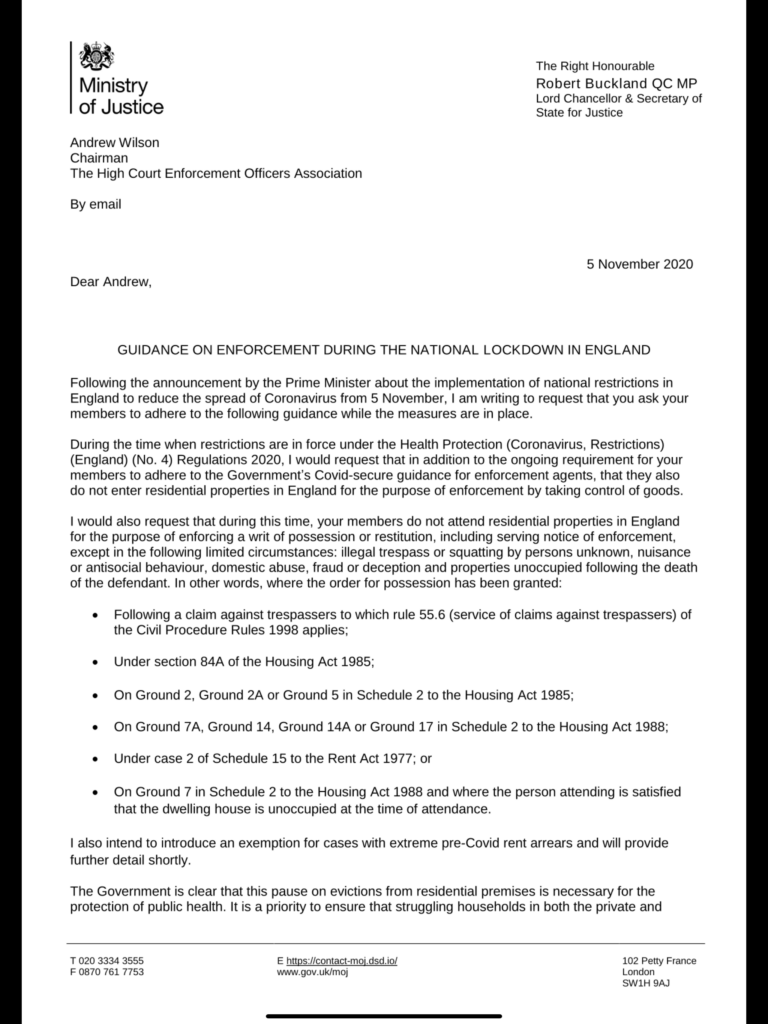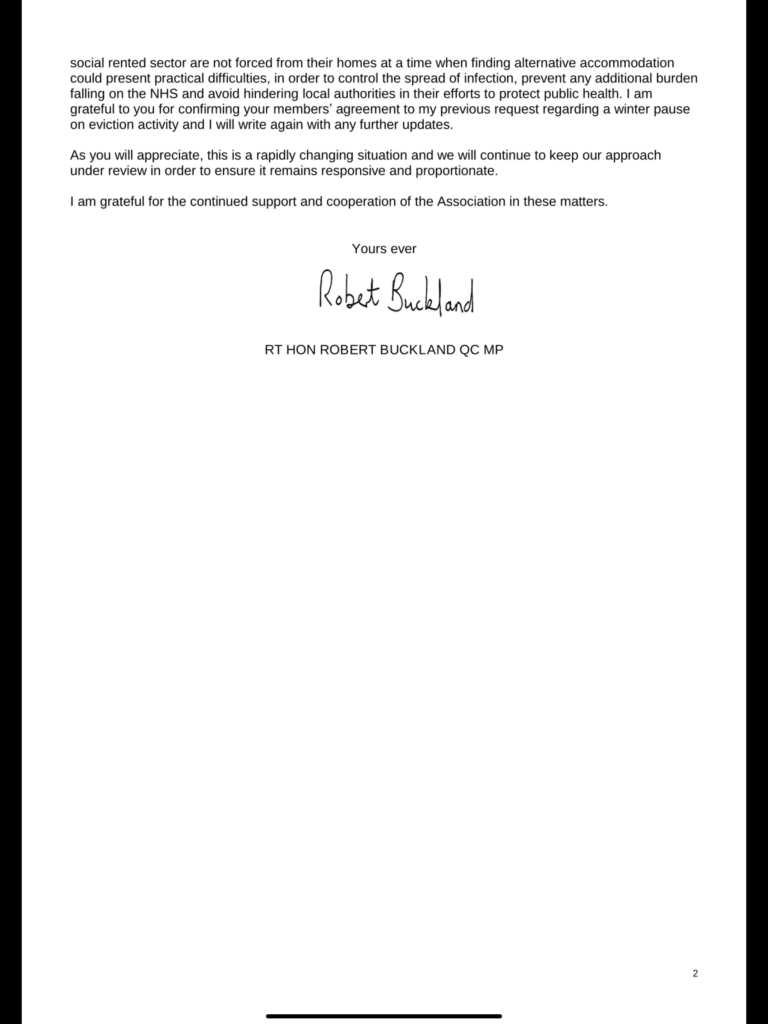Look, I have to be honest, this is getting silly now.
On evictions during the now commenced lockdown, the Lord Chancellor, Robert Buckland QC, has once again written a letter to the High Court Enforcement Officers Association (and one has to presume written in similar terms to county court bailiff bodies). Here is the letter.
On the one hand, this is an expected extension of the ‘Tier 2 and 3’ restriction on evictions to the whole of England during the lockdown.
On the other hand, this is a complete farce.
I previously noted the, shall we say, questionable legal status of an ‘eviction ban’ accomplished by a ‘request’ of the Lord Chancellor to the bailiffs’ organisations. This is now a ‘request’ which asks the bailiffs’ organisations to make exceptions for trespasser, ASB, fraud and ‘unoccupied after tenant death’ cases – heaven knows how the bailiffs are to know the ground of possession, as a warrant is based on a possession order which may well not specify the precise ground on which it was made.
And then there is the statement that the Lord Chancellor “will shortly introduce an exemption for cases with extreme pre-covid rent arrears”. Is this also to be done by a letter?
If the rationale for any suspension of evictions is that it is really not a good idea to be evicting people in the middle of a pandemic, then any exemptions don’t make sense. It is not as if the public health rationale is affected by the reason for eviction. People with pre-covid rent arrears don’t face or cause any less of a public health issue on eviction than anyone else. The coronavirus doesn’t rely on references.
But the reason I think this is particularly iffy and indeed dim, in that previously, it was only from a landlord position that any legal challenge to the legality of the Lord Chancellor’s suspension of evictions by letter was likely to come. See for example, this from David Smith, observing (quite correctly, I think):
The problem with the Government’s approach is that it is almost certainly unlawful. It is not open to Bailiffs or HCEOs to simply decline to enforce warrants and writs, even if the Lord Chancellor asks them to do so. They have a duty to do this. Indeed, there is a power to complain to the County Court, in the County Courts Act, about losses resulting from Bailiffs not enforcing warrants.
So far, no landlord challenge has been brought. It may be that the NRLA has parlayed the threat of one into ‘encouraging’ the Lord Chancellor making exceptions. But just as the Lord Chancellor cannot lawfully suspend evictions by a request, neither can the Lord Chancellor lawfully carve out exceptions to his request, on a personal whim, and that might give rise to other challenges.
It has, as I say, got silly. Evictions, or the lack of them, who gets evicted and who doesn’t, are not at the whim and fiat of the Lord Chancellor. This needs to be put on a statutory footing immediately. I don’t know a single housing lawyer, no matter who they act for, who thinks this is lawful.


By this logic, there’s a period from 02 Dec – 11 December (start of “winter truce”) where evictions can take place? Should we expect some involvement from Master of the Rolls and changes to CPR any time soon?
https://www.gov.uk/government/publications/understanding-the-possession-action-process-guidance-for-landlords-and-tenants/understanding-the-possession-action-process-a-guide-for-private-landlords-in-england-and-wales
seems to confirm the letter.
@ Kane TRO, this passage from Alan’s link there says this “Together with the pause on evictions starting in December that has been agreed with bailiffs, this means that evictions will not be enforced in England until the 11 January at the earliest”, ignoring the small window that might exist if we come out of lockdown on the planned date. I notice also that the guidance there says “bailiffs have been asked not to enforce evictions during the national restrictions “, curiously it doesnt say who did the asking, the nub of Giles’ article
It starts to get a little clearer, thanks to the MHCLG announcement late last night which can be found here:
https://www.gov.uk/government/news/new-protections-for-renters-over-duration-of-national-restrictions
“Renters will be protected during the national restrictions, with no bailiff enforcement action, the Housing Secretary Robert Jenrick has announced today (5 November 2020).
Measures, including the pause on evictions starting in December, mean evictions will not be enforced until the 11 January 2021 at the earliest, supporting individuals and families who have found themselves in financial difficulty through no fault of their own.
The only exceptions to this will be the most egregious cases, including where tenants have demonstrated anti-social behaviour or are the perpetrator of domestic abuse in social housing, and the landlord rightly would like to re-let their property to another tenant.”
I have not seen anything that defines what these ‘egregious cases’ are. Presumably someone will tell us at some point.
Thanks @Alan Armstrong and @Ben Reeve-Lewis.
I think my concern is that the restrictions are not backed up by any legislation. Even the Lord Chancellor’s “requests” are contradictory: the letter dated 05/11/20 states “while the measures [lockdown] are in place” which would suggest until 02 December 2020 (unless they know something we don’t; ignoring the already agreed ban for T2 and T3 areas) and on Gov guidance for possessions (updated yesterday at point 1.21
https://www.gov.uk/government/publications/covid-19-and-renting-guidance-for-landlords-tenants-and-local-authorities/coronavirus-covid-19-guidance-for-landlords-and-tenants) it states that the guidance given to HCEOA was to stop visits from 11 December 2020 – 11 January 2021.
I’m not satisfied that a Robert Jenrick press-release overrules an already loose “request” in writing from the Lord Chancellor, and the period between 02 December – 11 December 2020 remains unaccounted for (unless I’m missing a “request” letter that I would be grateful to have sight of).
I agree with Giles that this needs to be clarified in statue; not only to to clear up discrepancies, but also to allow for legal remedies for tenants who fall foul of rogue (or uninformed) enforcement agents.
We’re being governed by diktat now, Buckland doesn’t know what he’s doing, and as for “Baldrick”, well his inability to do anything just beggars belief.
@Kane I’m mindful that the Lord Chancellor’s letter was sent to HCEO governed by CIVEA. I’m presuming not all HCEOs are under that body, although I may be wrong. On the 5 or 6 occasions I have had the misfortune to enter into arguments with HCEOs I cant say that compassion and reasonableness were part of their operational model. Bear in mind, if they aint repossessing they arent earning income, unlike county court bailiff’s, so how long before landlords do as Dave Smith indicates there and complain to courts about income lost through bailiffs not actioning warrants.